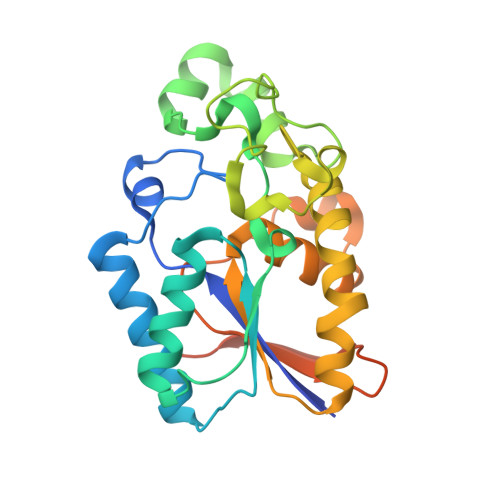An ensemble of structures of Burkholderia pseudomallei 2,3-bisphosphoglycerate-dependent phosphoglycerate mutase.
Davies, D.R., Staker, B.L., Abendroth, J.A., Edwards, T.E., Hartley, R., Leonard, J., Kim, H., Rychel, A.L., Hewitt, S.N., Myler, P.J., Stewart, L.J.(2011) Acta Crystallogr Sect F Struct Biol Cryst Commun 67: 1044-1050
- PubMed: 21904048
- DOI: https://doi.org/10.1107/S1744309111030405
- Primary Citation of Related Structures:
3EZN, 3FDZ, 3GP3, 3GP5, 3GW8, 3LNT - PubMed Abstract:
Burkholderia pseudomallei is a soil-dwelling bacterium endemic to Southeast Asia and Northern Australia. Burkholderia is responsible for melioidosis, a serious infection of the skin. The enzyme 2,3-bisphosphoglycerate-dependent phosphoglycerate mutase (PGAM) catalyzes the interconversion of 3-phosphoglycerate and 2-phosphoglycerate, a key step in the glycolytic pathway. As such it is an extensively studied enzyme and X-ray crystal structures of PGAM enzymes from multiple species have been elucidated. Vanadate is a phosphate mimic that is a powerful tool for studying enzymatic mechanisms in phosphoryl-transfer enzymes such as phosphoglycerate mutase. However, to date no X-ray crystal structures of phosphoglycerate mutase have been solved with vanadate acting as a substrate mimic. Here, two vanadate complexes together with an ensemble of substrate and fragment-bound structures that provide a comprehensive picture of the function of the Burkholderia enzyme are reported.
- Seattle Structural Genomics Center for Infectious Disease (http://www.ssgcid.org), USA. ddavies@embios.com
Organizational Affiliation:



















